|
|
 |
Fiche d'espèce de Copépode |
|
|
Calanoida ( Ordre ) |
|
|
|
Clausocalanoidea ( Superfamille ) |
|
|
|
Euchaetidae ( Famille ) |
|
|
|
Paraeuchaeta ( Genre ) |
|
|
| |
Paraeuchaeta similis (Wolfenden, 1908) (F,M) | |
| | | | | | | Syn.: | no Euchaeta similis : Giesbrecht & Schmeil, 1898 (p.52);
Euchaeta similis Wolfenden, 1908 (p.19, Descr.F, figs.F); 1911 (p.296, figs.F); Vervoort, 1957 (p.84, Rem.); Bradford, 1971 b (p.22, figs.F); Park, 1978 (p.227, figs.F); Hopkins, 1985 (p.197, Table 1, gut contents); Fontaine, 1988 (p.38, figs.F,M); Ward & Wood, 1988 (p.47);
Pareuchaeta similis : Farran, 1929 (p.208, 239) | | | | Ref.: | | | Bradford, 1981 (p.391, 400, figs.F,M); Bradford & al.,1983 (p.23); Razouls, 1994 (p.97, figs.F,M); Park, 1994 (p.321); 1995 (p.90, Rem.); Braga & al., 1999 (p.79, 84, tab.1, figs.6, 7, 8, Rem.: Biol. mol.) | 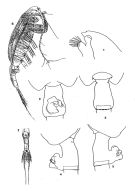 Female: 1, Head (lateral); 2, genital segment (ventral); 3, genital segment (dorsal); 4, genital segment (left lateral); 5, genital segment (right lateral); issued from : Park T. in Antarct. Res. Ser. Washington, 1978, 27: 91-290. 6, habitus (lateral view); 7, Urosome; Issued from : Wolfenden R.N. in Natn. Antarct. Exped. 1901-1904, Nat. Hist., Zoology, 1908, 4,: 1-46.
|
 issued from : J.M. Bradford in N.Z. Jl mar. Freshw. Res., 1981, 15 (4). [p.398, Fig.7]. Male (from McMurdo Sound): A, P5 (clasping a spermatophore); B, terminal part of left exopod of P5; C, serrated lamella; D, exopod of P1; E, terminal part of exopod of P2.
|
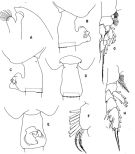 issued from : T. Park in Antarctic Res. Ser. Washington, 1978, 27. [p.228, Fig.82]. As Euchaeta similis. Female: A, forehead (lateral); B, C, D, E, distal end of metasome and genital segment (right side, left side, dorsal, ventral, respectively); F, outer lobe of Mx1; G, P1; H, P2. p1-2: legs (anterior).
|
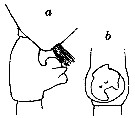 issued from : R.N. Wolfenden in Die Marinen Copepoden der Deutschen Südpolar-Expedition 1901-1903, 1911. [p.296, Fig.48]. As Euchaeta similis. Female: a, posterior corner cephalothorax and genital segment (lateral, right side); b, genital segment (ventral).
|
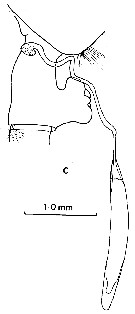 issue from : J.M. Bradford in N. Z. Jl Mar. Freshw. Res., 1981, 15. [p.392, Fig.1, C]. Female (from McMurdo Sound, Ross Sea): C, lateral view of genital segment with non-direct-placement spermatophore attached. Nota: Spermatophores of various sizes are attached to the genital segment; a small proportion which are long and wide are attached directly to the genital aperture but most are attached to the anterodorsal surface, usually on the right side, and tend to be longer and wider.
|
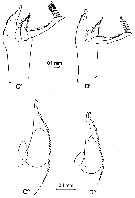 issued from : J.M. Bradford in N. Z. Jl Mar. Freshw. Res., 1981, 15. [p.395, Fig.4, C', D', C\"\", D\"]. Male (from McMurdo Sound, Ross Sea): C'-D', terminal part of left P5; C\"-D\", serrated lamella. Nota: Exopodal segment of P2 with outer spine of the 2nd segment smaller than the 2nd outer spine of the 3rd segmentThe serrated lamella ist twisted with a narrow terminal part. The lamella extends beyond the hairy tubercle by about one-quarter of the length of the lamella and is 3/5 the length of the 3rd exopodal segment; The serrated lamella appears to be very similar to that of P. austrina (Giesbrecht), but P. austrina is smaller (Body size: 4.75 mm).
|
 issued from : J.M. Bradford in N. Z. Jl Mar. Freshw. Res., 1981, 15. [p.401, Table 5 (part.)]. Female & Male (from Giesbrecht, 1902): Distinguishing features of species of Paraeuchaeta closely related to P. antarctica (* for code see p.393, Fig.2 in P. erebi).
|
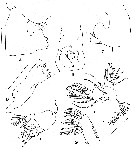 issued from M. Fontaine in Biol. Antarctic Seas XIX, Antact. Res. Ser., 1988, 47. [p.39, Fig.9]. As Euchaeta similis. Female (from Ross Sea): A-C, genital segment (right lateral, ventral, and left lateral, respectively); D, Md (gnathobase); E, Md (mandibular palp); F-G, Mx1. Scale bars 0.5 mm each; Nota: A2 almost identical with that of P. antarctica but with only 1 seta at distal inner corner of endopod segment; exopod segment 2 with an even more minute seta than in P. antarctica.
|
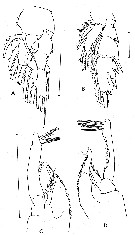 issued from M. Fontaine in Biol. Antarctic Seas XIX, Antact. Res. Ser., 1988, 47. [p.40, Fig.10]. As Euchaeta similis. Female: A, P1; B, P2. Nota: Relative lengths of outer edge spines and setae (code see in P. antractica). Exopod of P1: Aa ≥ AB; Bb ± 3/2 BC; Cc ± 3/2 BC. Exopod of P2: Aa ± 3/2 AB; Bb ± 1/2 BC; Cc ± 3/4 CD. Male: C-D, distal portion of left P5 (lateral and medial views). Scale bars: 0.5 mm each.
|
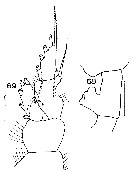 Issued from : J.M. Bradford in N.Z. Oceanogr. Inst., 1971, 206, Part 8, No 59. [p.21, Figs.68, 69]. As Euchaeta similis. Female (from 76°46.5'S, 165°48'E): 68, genital segment (left side); 69, P1. Scale bar: 1 mm (68); 100 µm (69).
|
 Paraeuchaeta similis Female: 1 - See key to species Groups and independent species of Paraeuchaeta (p.30). 2 - None of endopodal setae of Mx2 armed with long spinules in addition to usual spinules. 3 - Genital segment without transverse ridge on ventral side anterior to genital prominence (Fig.82 C, E in Park, 1978). 4 - Ventrally, genital field strongly asymmetrical (Fig.82 E in Park, 1978).
|
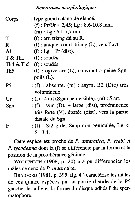 Issued from : C. Razouls in Ann. Inst. océanogr., Paris, 1994, 70 (1). [p.97]. Caractéristiques morphologiques de Paraeuchaeta similis femelle et mâle adultes. Terminologie et abbréviations: voir à Calanus propinquus.
| | | | | Ref. compl.: | | | Sewell, 1948 (p.574); Razouls & al., 2000 (p.343, tab. 2, 5, Appendix); Schnack-Schiel & al., 2008 (p.1045: Tab.2); Park & Ferrari, 2009 (p.143, Table 3, 8, Appendix 1, biogeography, Rem. p.166) | | | | NZ: | 1 | | |
|
Carte de distribution de Paraeuchaeta similis par zones géographiques
|
| | | | | | 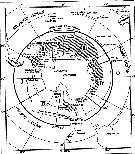 issued from : W. Vervoort in B.A.N.Z. Antarctic Reseach Expedition, Reports - Ser. B, Vol. III, 1957 [Fig.69]. As Euchaeta similis. issued from : W. Vervoort in B.A.N.Z. Antarctic Reseach Expedition, Reports - Ser. B, Vol. III, 1957 [Fig.69]. As Euchaeta similis.
Chart showing the geographical distribution (white triangle) in the seas surrounding the Antarctic continent.
Nota: In this chart the area frequented by whaling vessels has been hatched. The Antarctic circle (66°.5 S) has been drawn as a broken line. The numbers I to VI refer to the sectors into which the Antarctic seas are divided according to Mackintosh (1942) (after Vervoort, 1951). |
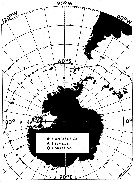 issued from M. Fontaine in Biol. Antarctic Seas XIX, Antact. Res. Ser., 1988, 47. [p.36, Fig.6]. issued from M. Fontaine in Biol. Antarctic Seas XIX, Antact. Res. Ser., 1988, 47. [p.36, Fig.6].
Occurrence of P. similis.
Open circles show stations where no adults were found. Solid line: Antarctic Convergence.
Nota: After Fontaine (1988, p.38) P. simolis, like P. erebi, is most numerous in samples collected close to the Ross Ice Shelf. Bradford (1981) found P. similis to be less common than P. erebi under the ice, but suggests that P. similis, like P. erebi, breeds under the ice and is carried northward into the Ross Sea by the movement of Ross Sea shelf waters. Yet P. similis is also a ‘’ typical inhabitant ‘’ of Warm Deep Water (Vervoort, 1965). Having been carried northward into Circumpolar Deep Water, it is able to establish itself in the warmer, less saline deep current, flowing westward around the Antarctic continent. |
| | | | Loc: | | | Antarct. (W Weddell Sea, SW Atlant., Indian, SW & SE Pacif., Croker Passage, Cap Evans, Ross Sea, Ross Ice Shelf) | | | | N: | 14 | | | | Lg.: | | | (10) F: 9,8-8,6; (20) F: 10,16-9,66; (25) F: 10,8; (35) F: 10; (102) F: 10,2-10; (103) F: 10,2-8,8; M: 7,7-6,1; {F: 8,60-10,80; M: 6,10-7,70}
The mean female size is 9.842 mm (n = 10; SD = 0.6264), and the mean male size is 6.900 mm (n = 2). The size ratio (male : female) is probably ± 72 %. | | | | Rem.: | Sampling depth (Antarct.) : 700-2000 m. | | | Dernière mise à jour : 28/01/2017 | |
|
|
 Toute utilisation de ce site pour une publication sera mentionnée avec la référence suivante : Toute utilisation de ce site pour une publication sera mentionnée avec la référence suivante :
Razouls C., Desreumaux N., Kouwenberg J. et de Bovée F., 2005-2025. - Biodiversité des Copépodes planctoniques marins (morphologie, répartition géographique et données biologiques). Sorbonne Université, CNRS. Disponible sur http://copepodes.obs-banyuls.fr [Accédé le 18 mai 2025] © copyright 2005-2025 Sorbonne Université, CNRS
|
|
 |
 |
















